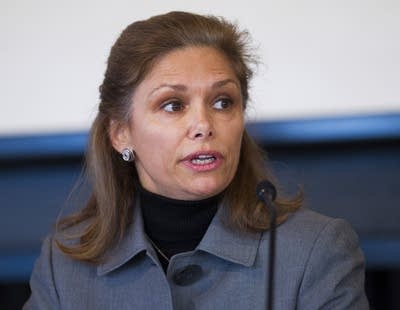Jeff Anderson hopes roots count in race

By MARTIGA LOHN
Associated Press
MINNEAPOLIS (AP) — Former Duluth City Councilor Jeff Anderson is aiming to make local connections count for more than money as he competes with two fellow Democrats for the right to challenge GOP U.S. Rep. Chip Cravaack in a nationally watched congressional race.
The 35-year-old native of Ely, on Minnesota's Iron Range, faces a fundraising disadvantage against former state Sen. Tarryl Clark, who moved to the district after losing to Republican Rep. Michele Bachmann two years ago in the nation's most expensive House race in another district. He doesn't have congressional experience or the Democratic-Labor-Farmer Party endorsement that went to former Rep. Rick Nolan, who served in Congress from 1975 to 1981.
Instead, Anderson hopes ties forged during a life spent in Minnesota's 8th District and recent experience working on jobs as an elected official will vault him to the front of the field. Anderson, Clark and Nolan are competing in an Aug. 14 primary that will determine Cravaack's opponent in November.
Create a More Connected Minnesota
MPR News is your trusted resource for the news you need. With your support, MPR News brings accessible, courageous journalism and authentic conversation to everyone - free of paywalls and barriers. Your gift makes a difference.
"I want us to have a representative that has some skin in the game, and I have that," Anderson said Thursday in an interview with The Associated Press.
Democrats were surprised in 2010 when Cravaack, an untested Republican candidate, broke through to blue-collar voters and narrowly defeated Democratic Rep. Jim Oberstar, who was seeking his 19th term and hadn't faced a close election in decades. This year, Cravaack ranks among national Democrats' top targets. Outside groups are expected to sink money into the race in a district that stretches from the northern Twin Cities suburbs to the Canadian border.
This year, Oberstar's blessing went to Nolan — despite Anderson's efforts to persuade the former representative to stay on the sidelines until after the primary. Anderson met with Oberstar and reminded him that he ran in a primary in 1974, the year he won the seat.
"I said, `I think that the people of the 8th Congressional District would be best served if you supported whoever wins this primary. Let the people decide,"' Anderson said. "That was Jim Oberstar's slogan in 1974, let the people decide, and so I think that's fitting in 2012."
Anderson brushed off criticism that he is inexperienced, a point Clark made earlier this week in an AP interview.
"Like Jim Oberstar, I'm a guy running for Congress in my 30s," Anderson said. "Except I've already held public office, I've served as president of the city council, I've worked in business, I'm a veteran. These are all things that Jim Oberstar did not have on his resume when he ran for Congress in 1974."
Anderson dismissed Clark's candidacy as personal ambition, calling her move into the district "political tourism."
"We have a name for folks like that back home in Ely," Anderson said. "We call them packsackers."
Clark spokesman Joe Fox said Clark has long ties to the district as a church volunteer, nonprofit executive and attorney.
Anderson also criticized Nolan as being too tied to the past.
"Two years ago the people of the 8th Congressional District rejected a congressman who was elected in 1974," he said, referring to Oberstar. "Rick Nolan is another congressman who was elected in 1974."
Nolan spokesman Steve Johnson said Nolan's experience — including a successful private-sector career — is an important asset as he seeks to return to Congress.
Anderson badly trails Clark in fundraising. He said he expects to raise an election-cycle total of $200,000 to $250,000 by the primary, after reporting raising $113,000 through the end of March. He said that will be enough to win the primary. Anderson has also been knocking on doors in cities including Crosby, Emily, Cloquet, Hibbing and Duluth.
During his single term on the Duluth City Council, Anderson also served on the Duluth Economic Development Authority, where he said he worked on projects to bring an aircraft maintenance company and a data storage facility to town. He also worked on a "mini-stimulus" program offering grants and loans to businesses that created jobs.
"I do believe government does help create jobs and opportunities," he said.
Anderson also pushed the council to create a domestic partnership registry and oppose a constitutional amendment banning same-sex marriage.
He served in the Minnesota Army National Guard and is on leave from his job as a sales manager for a group of radio stations.
A descendant of miners, Anderson characterized himself as the most supportive of the three Democrats when it comes to proposed copper and nickel mining on the Iron Range. He would like to amend the Clean Water Act to raise the allowed level of sulfates to hold the proposed precious metals mining projects to the same standard as farming, wastewater treatment plants and taconite mining.
"Congressman Cravaack has been very pro-mining, and he's been very supportive of these projects," Anderson said. "Whichever Democrat goes up against Rep. Cravaack, they need to be very supportive of these projects. Because it's important. It's the economic future of the Range.


